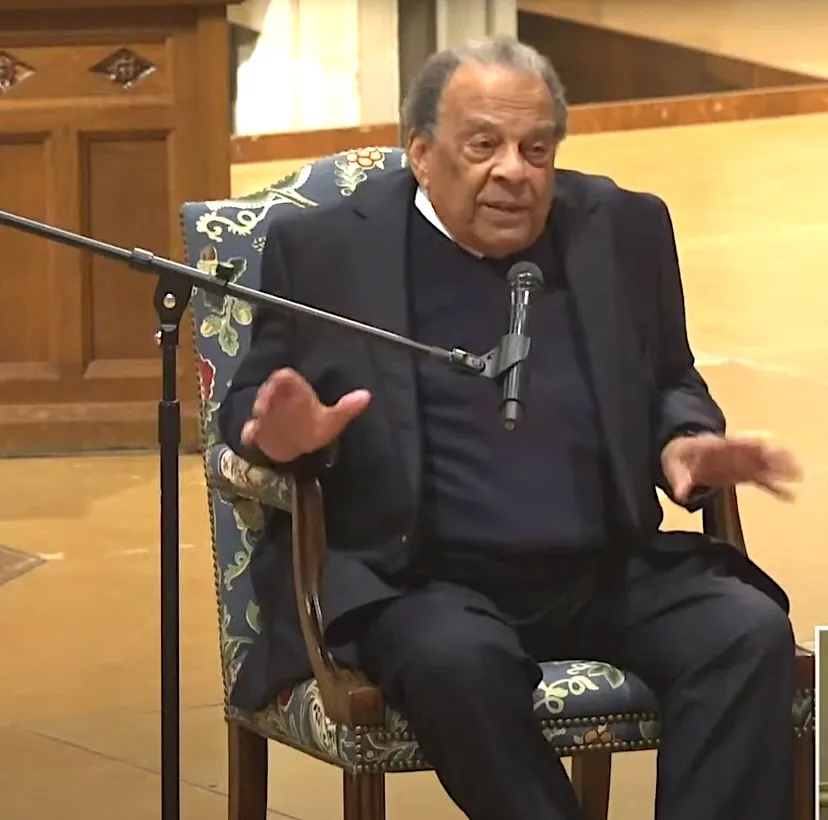“Never let your adversary define the problem, because the things that President Trump considers problems, I consider blessings,” Andrew Young told Geoff Bennett on the “PBS News Hour.” (Credit: PBS/YouTube)
Hello, all,
Our next Roundtable takes place by Zoom at 7 p.m. ET on Wednesday, April 30, on “What the Civil Rights Movement Can Teach Journalists About Dealing With Trump and Trumpism.”
The session, originating at the George Washington University School of Media and Public Affairs, will be simulcast on Facebook at < https://www.facebook.com/RPjournalisms/ > and posted afterward on the Journal-isms YouTube channel.
Our panelists are:
Andrew Young, chairman of the Andrew Young Foundation, veteran of the Southern Christian Leadership Conference, former mayor of Atlanta, former U.S. ambassador to the United Nations. (Now 93!)
Courtland Cox, chairman of the SNCC Legacy Project, and Judy Richardson, board member of the Project, documentary producer (including work on “Eyes on the Prize”), currently co-directing the new visitor center film for the National Park Service’s Frederick Douglass House in Washington, D.C.
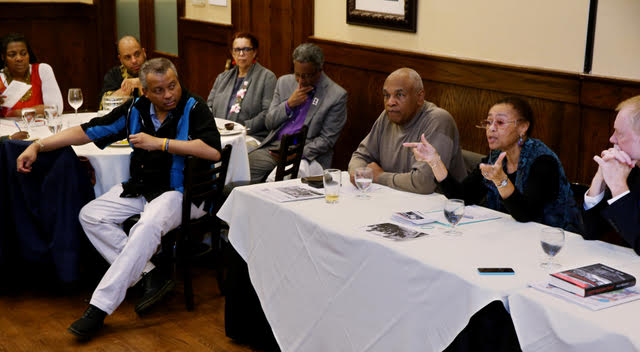
SNCC veterans Courtland Cox, center, and Judy Richardson at the February 2020 Journal-isms Roundtable. With them, at right, is Jerry Mitchell, whose book, “Race Against Time,” discusses his pursuit of civil rights and Klan-related cold cases in Mississippi. (Credit: Sharon Farmer/sfphotoworks)
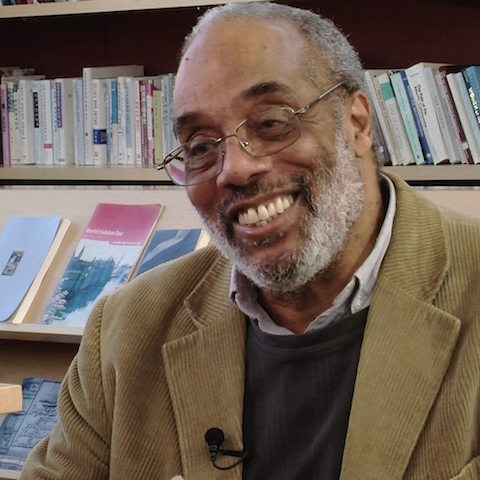 Charles Cobb (pictured), who in addition to being a former field secretary with SNCC, is also a co-founder of the National Association of Black Journalists, now celebrating its 50th year, will be part of the panel.
Charles Cobb (pictured), who in addition to being a former field secretary with SNCC, is also a co-founder of the National Association of Black Journalists, now celebrating its 50th year, will be part of the panel.
Also in the room:
- Peggy Trotter Dammond Preacely, grandniece of William Monroe Trotter (1872-1934), activist editor of the Boston Guardian who helped form the Niagara Movement and create the National Association for the Advancement of Colored People (NAACP), from which he later broke ranks. Trotter is also known for confronting President Woodrow Wilson in the White House over Wilson’s opposition to Black progress.
- Nicholas Patler, University of Virginia historian who has written about Trotter.
Journalists who have covered the civil rights movement, including:
- Dorothy Butler Gilliam, then writing for the Tri-State Defender in Memphis, the Washington Post and other outlets.
- Hank Klibanoff, professor, journalist, historian; co-author of “The Race Beat: The Press, the Civil Rights Struggle and the Awakening of a Nation.”
- Barbara Reynolds, then writing for the Cleveland Press, Ebony, the Chicago Tribune and other outlets.
- Carole Simpson, retired weekend anchor at ABC News who had covered the Movement for WBBM and WMAQ in Chicago
- Jack E. White, retired columnist for Time magazine who also wrote for the Race Relations Reporter
We have as Roundtable participants others who covered the civil rights movement, were inspired by it or want to know more about it.
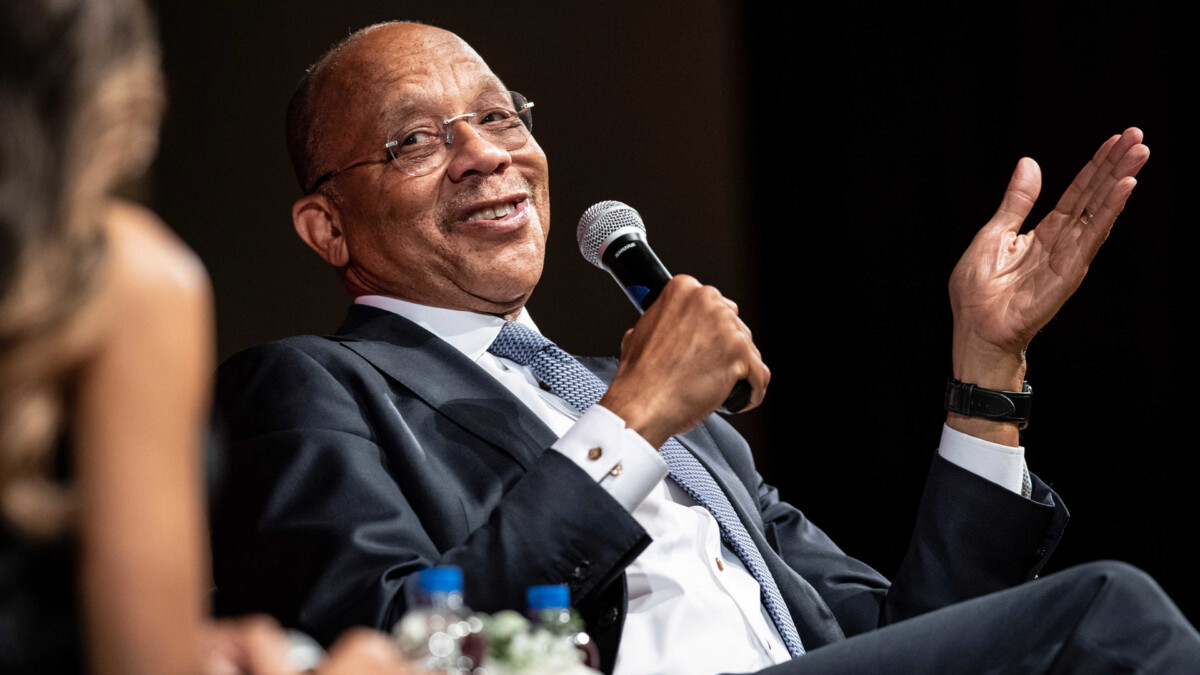 In addition, we will toast Pulitzer Prize-winning columnist Eugene Robinson (pictured), who resigned earlier this month from the Washington Post.
In addition, we will toast Pulitzer Prize-winning columnist Eugene Robinson (pictured), who resigned earlier this month from the Washington Post.
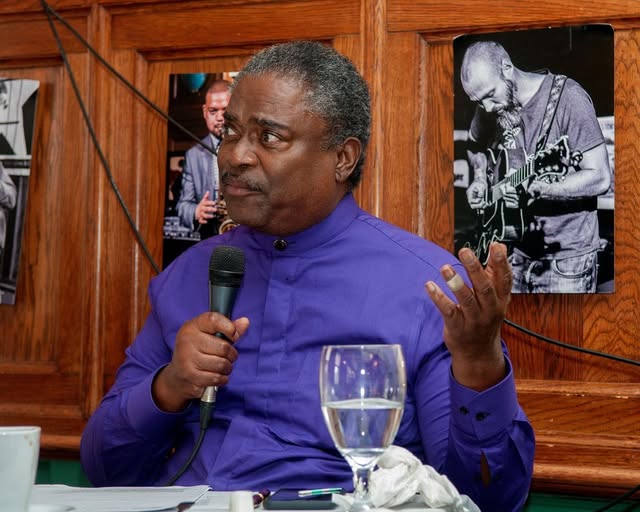 We will also remember Kenneth Walker, a member of our Journal-isms Roundtable Strategy Committee who died April 11.
We will also remember Kenneth Walker, a member of our Journal-isms Roundtable Strategy Committee who died April 11.
Ambassador Young will be a first-timer with us. Courtland Cox and Judy Richardson were impressive when they appeared at our final Roundtable before the pandemic, in February 2020. The video by Janice Temple is at < http://bit.ly/2u60Rbw > The narrative and photos are on Facebook at < http://bit.ly/2v6iAzZ > for part 1 and < http://bit.ly/3cjkY7w > for part 2.
The event summary includes words that sound familiar today: “Our roundtable took place as an emboldened Donald Trump continued an assault on democratic institutions after his acquittal by the U.S. Senate on impeachment charges, the early stages of the Democratic presidential primaries, and newspapers under both presidential and economic assault.”.
As commentators have pointed out, many in the United States today are angry and looking for leadership. That includes journalists.
Consider these developments since the second Trump administration took office in January:
- Books authored by Black journalists, commentators and others were removed from the Naval Academy Library.
- Three congressional Democrats sought documents from the head of the Federal Communications Commission last week “as part of a probe into what they called ‘sham’ investigations into media outlets including CBS, NBC and ABC launched by the agency under President Donald Trump to try to intimidate the news media,” as Reuters reported.
- Journalists at the Los Angeles Times and Washington Post have tendered resignations over their publishers’ moves to appease the Trump administration.
- FCC Chairman Brendan Carr said the commission is prepared to block mergers and acquisitions involving companies that continue promoting diversity, equity and inclusion policies.
- The administration blocked The Associated Press from events “and taken control of the White House pool, throwing out a century of media independence and giving the government the power to select who is allowed to cover the president,” in the words of media writer Oliver Darcy.
- “This presidential press pool change . . . is akin to state-run media in Russia and China where the leader expects the press to deliver favorable news on and about him and reporters ask questions that will not raise his ire,” wrote April Ryan in the Daily Beast.
- “The White House correspondents’ dinner axed its traditional comedy act this year, canceling comedian Amber Ruffin as host a day after a Trump administration official called her ‘hate-filled’ because of her jokes about the president,” as described by the New York Daily News.
- That’s not to mention that the U.S. Agency for Global Media, which runs Voice of America, intends to fire more than 1,200 journalists, engineers and other staff that it sidelined in the wake of Trump ordering its funding slashed. That’s halted for now, thanks to a federal judge. But Ghana Web reported that the VOA had gone off the air in Ghana, Nigeria, Niger and other African countries.
- Kenneth B. Morris Jr., descendant of Frederick Douglass, writes in a Black History Month essay on what his ancestor would do in these times: “He would be blunt about the scale of the challenge and what is required of anyone seeking change and justice. . . “
What should be the response of journalists and the organizations that represent them?
The SNCC Legacy Project gave a window into its thinking with this statement.
SNCC Says: ‘It’s Dark, But It’s Not Midnight’ (scroll down) Watch the video here.
And on the “PBS News Hour” last month, Ambassador Young told Geoff Bennett, “Never let your adversary define the problem, because the things that President Trump considers problems, I consider blessings.” (video)
Rep. Emanuel Cleaver, D-Mo., wrote in an op-ed in the Washington Post, “the people, not the politicians in Congress, are the architects of this nation’s future, and they will ultimately decide whether we revive our democracy or slide further toward autocracy.“
SNCC Loses NEH Funding; Duke Institute to the Rescue
From Judy Richardson on April 21: We have our last “SNCC & Grassroots Organizing” virtual event this evening. This one is on Women & Gender in SNCC. We’ll include a special message at the beginning of tonight’s session, since NEH terminated our already-received funds as we were touching down for the Claflin Univ. event 2 weeks ago:
At this point we usually say: “The SNCC and Grassroots Organizing discussion series has been made possible in part by a grant from the National Endowment for the Humanities.”
We must now alert you to this:
Two weeks ago, as we were traveling to Claflin University for our 3 events there, we received an email from the Trump Administration stating that our project was being terminated; that we could not even use the funds already approved by Congress, which we’d received and committed.
“Your grant no longer effectuates the agency’s (NEH’s) needs and priorities… Your grant’s immediate termination is necessary to safeguard the interests of the federal government… The termination of your grant represents an urgent priority for the administration.”
However, our partners at Duke University’s John Hope Franklin Humanities Institute saved the day. As a result of their strong support, we are still able to offer our two final events in this series: this virtual conversation tonight and the Toolkit session — on SNCC and Black Power — at the Mississippi Civil Rights museum in Jackson, this coming Saturday, on April 26.
There is power in the history we will be sharing with you tonight. And… there are those who would try to suppress that power. We will not let them. Because, as the Freedom Song says: “Ain’t gonna let nobody turn me ‘round’.
To subscribe at no cost, please send an email to journal-isms+subscribe@groups.io and say who you are.
Facebook users: “Like” “Richard Prince’s Journal-isms” on Facebook.
Follow Richard Prince on Twitter @princeeditor
Richard Prince’s Journal-isms originates from Washington. It began in print before most of us knew what the internet was, and it would like to be referred to as a “column.” Any views expressed in the column are those of the person or organization quoted and not those of any other entity. Send tips, comments and concerns to Richard Prince at journal-isms+owner@
View previous columns (after Feb. 13, 2016).
View previous columns (before Feb. 13, 2016)
- Journal-isms Roundtable on How Journalists Can Survive and Thrive on the Web (video, March 24, 2025)
- Diversity’s Greatest Hits, 2018 (Jan. 4, 2019)
- Book Notes: Is Taking a Knee Really All That? (Dec. 20, 2018)
- Book Notes: Challenging ’45’ and Proudly Telling the Story (Dec. 18, 2018)
- Book Notes: Get Down With the Legends! (Dec. 11, 2018)
- Journalist Richard Prince w/Joe Madison (Sirius XM, April 18, 2018) (podcast)
- Richard Prince (journalist) (Wikipedia entry)
- February 2018 Podcast: Richard “Dick” Prince on the need for newsroom diversity (Gabriel Greschler, Student Press Law Center, Feb. 26, 2018)
- An advocate for diversity in the media is still pressing for representation, (Courtland Milloy, Washington Post, Nov. 28, 2017)
- Morgan Global Journalism Review: Journal-isms Journeys On (Aug. 31, 2017)
- Journal-isms’ Richard Prince Wants Your Ideas (FishbowlDC, Feb. 26, 2016)
-
Richard Prince with Charlayne Hunter-Gault, “PBS NewsHour,” “What stagnant diversity means for America’s newsrooms” (Dec. 15, 2015)
- Book Notes: Journalists Follow Their Passions
- Book Notes: Journalists Who Rocked Their World

